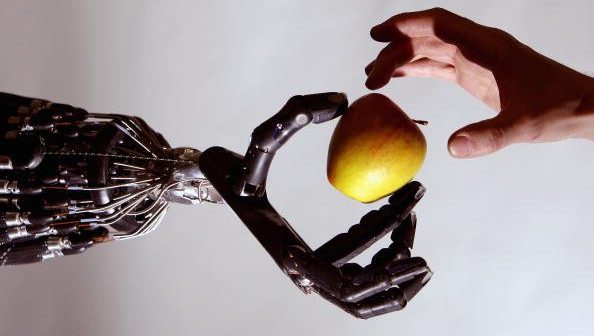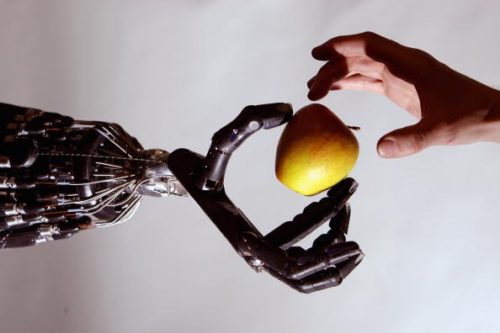- Artificial Intelligence can help people with amputated body parts as it can be taught to resemble human movements. Source: Twitter: @DeepLearn007
- Artificial intelligence is used in more and more devices. Cortana used by Microsoft in the Windows 10 is an example of such a software. Source: Twitter: @MarquesOlivia_
- Self-Driving cars such as the machines used by Uber, might replace human drivers in the future. The cars are equipped with Artificial Intelligence that allows them to operate. Source: Twitter: @monishd
By:Rafal Matuszczak
Currently, artificial intelligence is one of the most rapidly developing fields of information technology. Even though many people might not realize that they interact with artificial intelligence on a daily basis, the truth is that every year the technology is being implemented in more and more devices.
Despite all the benefits that artificial intelligence (AI) brings to the society, there is a fear that development of the technology might result in negative consequences. One of the biggest concerns is that more advanced artificial intelligence might eventually take away people’s jobs, as they will be replaced with the technology that will most likely be able to accomplish the jobs tasks faster, and what is more important, artificial intelligence will not have to get paid for doing the job.
Intelligent machines might be a good asset for every organization, for the machines will do whatever people tell them to do, and they will not ask questions. Motherjones.com indicates that it might be one of the reasons why artificial intelligence will take over people’s jobs, and replace them eventually as the machines will become more powerful, and labor will become more worthless.
An Instructor of Computer Science from the department of Computer Science and Information Systems at Saint Leo University, Ms. Eva Groudas, explained what capabilities a machine has to have to be named intelligent.
“An intelligent machine has the capability to make a decision without being directly told what to do and that decision is based on supplied information. Many more advanced AI systems today are moving towards machine-learning where a machine is capable of learning beyond what it is told/given and able to change its decisions based on the continued learned knowledge and behavior,” said Groudas.
However, in such case, why all of the software on the market is not called an artificial intelligence, and how can somebody determine where the border line that separates the software from artificial intelligence is? And what is more important, can machines really think?
The questions have intrigued people from the first days since the artificial intelligence has been invented. In fact, the intrigue about the machines’ ability to think has led one of the fathers of Artificial Intelligence to inventing the technology. Also, not only he built foundation of the technology, but also he designed a test that can determines whether a machine is intelligent or not.
In 1950, an English scientist Alan Turing, who during the World War II has also contributed to breaking the code of a German cryptographic machine, Enigma, has published a paper in which he elaborated on the questions whether machines can or cannot think, according to The Washington Post. The article indicates that Turing has also designed the so-called Turin Test which answers the questions whether a computer can convince a human that, the machine is indeed another human. Turing, made an assumption that in order to accomplish this test, the computer would have to be intelligent.
“I shall replace the question by another, which is closely related to it and is expressed in relatively unambiguous words. The new form of the problem can be described in terms of a game which we call the ‘imitation game,’” said Turing in his paper according to The Washington Post.
Even though the test has been designed more than 65 years ago, none of the machines invented by people have been able to pass it until 2014. During an even held by the University of Reading in London, a computer program, Eugene Goostman which simulates a 13 years old boy, managed to convince 33% of the jury that it is a human. In order to pass the Turing test, the score has to be equal to 30%, and achieving this goal was a milestone in the field of Computer Science, according to reading.ac.uk.
Nevertheless, some people might wonder what an artificial intelligence is and how it differs from regular software and how each is created.
“Software engineers develop artificial intelligence software for specific applications. Creating general software, that does not use AI, involves programming a device to do a set of instructions and it does it as it is told. Artificial intelligence software is developed so that you provide information to the device and the AI software then decides what to do with it,” said Groudas.
The main difference between regular software and artificial intelligence is that the latter is capable of making decisions without human’s interaction. Nowadays, such applications are included in many devices that people use in their daily life as artificial intelligence makes their life more convenient. Programs that are capable of recognizing human language and translating it into computer’s instructions, such as Siri installed on Apple devices, are examples of artificial intelligence.
“Anyone today can use the digital personal assistants like Siri, Google Now, or Cortana which are AI applications. Most advanced applications today use some form of artificial intelligence to market products to you, to choose the best article it thinks you will be interested in, to gaming applications, to medical applications, and many other ways,” said Groudas.
Nevertheless, artificial intelligence does not only make people’s life easier, but soon, it might replace them entirely in many of the daily activities. For example, self-driving cars, of which development is possible due to the invention of artificial intelligence, might in the future become the primary way of transportation for many people.
“Some might think artificial intelligence is mostly used by militaries for unmanned vehicles and other advanced purposes to protect us, but the truth is AI is used every day all around us. Today, artificial intelligence has continued to help us in so many ways that we don’t think about it, and now we tend to expect it to have it included in almost everything,” said Groudas. “Today, it is easier to ask what does not use artificial intelligence.”
The Washington Post indicates that nearly 50 percent of the people who are currently employed in the United States are at risk of being replaced by machines during the next two decades. The statistics were revealed in the study conducted by the University of Oxford in 2013, and which identified transportation, logistics and administrative occupations as the most vulnerable. However, the article also designates, that the world is not going towards the stage at which people will not work anymore. In fact, most likely, people will still play a role in the world’s economy even though it is unclear what positions they will be doing.
The rapid development of technology, and lower prices of hardware might also contribute to the development of artificial intelligence.
“The development of hardware will definitely result in creating more intelligent software from wearable hardware devices to the “Internet of things” devices. As we grow accustom to having smarter devices doing more for us, our thirst for more devices grows,” said Groudas.
Nonetheless, despite the risk of being replaced by machines, many people might be excited about the development of artificial intelligence as it means that their devices might soon have many more features useful in daily life. Just as smartphones revolutionized the market of mobile phones, artificial intelligence might change the way people interact with the current devices and revolutionize the way they live.
“The tech and device market has revolutionized AI and AI has revolutionized the market for more devices and tech. As they build smarter wearable devices, the demand for AI has grown. As AI capabilities have excelled with machine learning, the spark for more devices that could use the technology has grown,” said Groudas.
Even though there is still a lot to come in regards to the development of Artificial Intelligence, it has already had such an impact on people’s life that, nowadays, for many people, it could become difficult to live if the technology suddenly disappeared.
“From cruise control, to GPS navigation, to have a car self-park or alert you when a vehicle is in your blind spot, vehicle corporations acknowledge the importance of adding artificial intelligence and seek to add more artificial intelligent applications with a goal to have the vehicle self-drive and continue to satisfy the thirst for the latest “smartest” innovations. More importantly, when we go to our medical professionals, there are advanced technology systems that use artificial intelligence to diagnosis illness and AI robotic systems that do surgeries with the supervision of physicians,” added Groudas.








